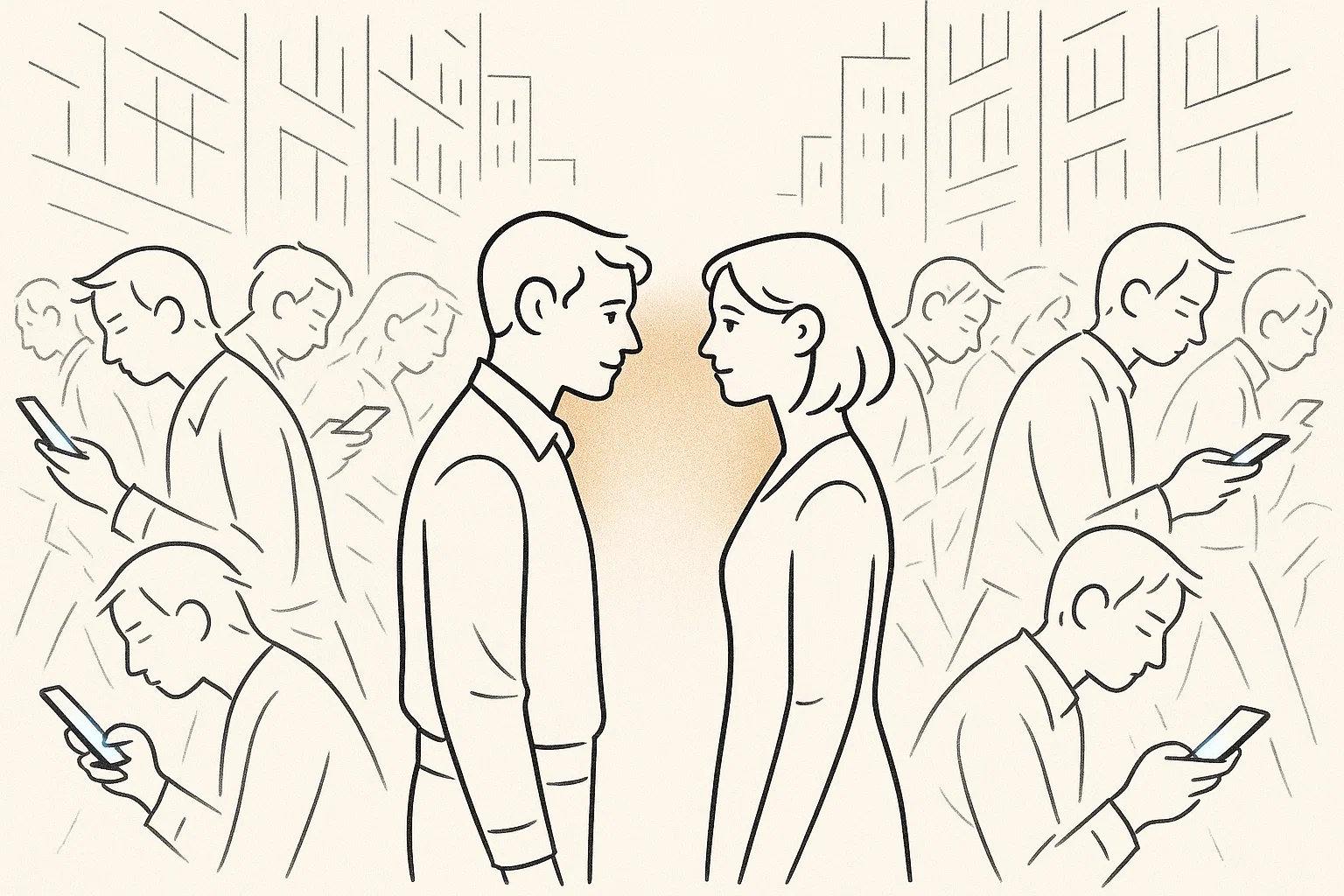I have a cure for seventy percent of your problems.
I’m not offering a pill you swallow. I’m not a guru you worship. I don’t have a Tik Tok channel you can follow. No. The answer is far more ancient, and far more vital: I’m offering you connection.
When we’re in pain, the kind that whispers behind the anxiety, that fuels the quiet burnout, that gnaws at the fear no one truly knows us, we usually go looking for complex answers. We read books, we visit therapists, we get gym memberships, we do late-night Google searches… whatever. We’re trying, desperately.
But if we’re brutally honest, most of the insidious suffering we carry doesn’t come from a lack of effort. It comes from disconnection. The aching truth is that we were never, ever meant to do this alone, and that “aloneness” accounts for roughly 70% of the problems we experience.
We were designed to be held by something real. We were made to need a circle, a crew, and a place where we belong without having to earn it every single day. Most of what is quietly breaking us, the pervasive loneliness, the emotional numbness, the fragile relationships that shatter at the slightest pressure, even the puzzling decline of our physical health, doesn’t require a miracle to fix.
It requires other people.
Specifically, it requires the kind who genuinely care, the kind who check in without being asked, the kind who know when you’re not okay, and stick around anyway.
This isn’t a vague idea or a poetic metaphor to make you feel good. This is about building the kind of tribe we need. This project is a grand social experiment designed to create a clear, repeatable way to craft real human connection in a world that profits from our isolation.
This isn’t just a series of blog posts; it’s a roadmap for the very thing your nervous system has been craving for too long. And if you follow this roadmap, you won’t just feel better, you’ll start becoming who you were supposed to be all along.
The Reality of Modernity
We live in a world that promises us everything, doesn’t it? A life of effortless comfort, seamless connection, boundless convenience… it’s all supposed to be at our fingertips, delivered with the swipe of a screen or the click of a button. Our refrigerators overflow with more choices than our ancestors could have dreamed of, our calendars are packed with opportunities for advancement, and a constant stream of information promises to keep us forever in the loop.
Yet, here we are, many of us battling a persistent, unsettling ache. It’s a gnawing sense that something essential is missing, a profound emptiness that creeps in despite all the external gains. We feel disconnected, overwhelmed, and strangely numb, even as our lives glitter with achievements and digital affirmations.
This isn’t just a passing mood; it’s a profound paradox of our time. We’ve built a society of unprecedented prosperity, solved ancient problems of scarcity and survival, and yet, we find ourselves drowning in a new kind of suffering.
We’re burdened by chronic anxiety, haunted by a pervasive sense of isolation, and often operating on autopilot, unable to truly feel the rich landscape of our own lives. It’s a strange, echoing silence we find in our hearts amidst such dazzling abundance, isn’t it? It’s if all the noise of progress has drowned out the song of our own souls.
The “Achievement Hangover”: When Success Leaves Us Hollow
From the moment we can grasp a pencil, we’re taught to strive, to achieve, to climb. The narrative is deeply ingrained:
Success equals happiness
Get the grades, land the job, buy the house, acquire the accolades. Each milestone, we’re promised, will deliver a deeper sense of fulfillment. We chase the promotions, the impressive titles, and the curated social media presence, convinced that reaching the next rung will finally quiet the internal whisper of inadequacy. And for a while, there’s a rush, isn’t there? We feel a flicker of satisfaction when the applause rolls in, a brief ego boost when the recognition arrives. We tell ourselves we’re building or we’re impacting… sometimes we even tell ourselves we’re becoming.
But then, the echo returns.
Louder this time.
I remember a moment in my early 20’s, after I’d hit what was, by all societal measures, a significant professional milestone. I graduated. I’d worked myself ragged, sacrificed relationships, ignored my own well-being, all for this singular goal. And standing there in a crowd after the commencement, in the aftermath, the overwhelming feeling wasn’t pride or joy, but an unsettling emptiness. It felt like I’d just jumped through a hoop someone else was holding, like a well-trained dog, only to find the treat was made of cardboard. There was a dread that crept in, a quiet, insidious question: Is this it? Is this what life is supposed to feel like?
That was my achievement hangover. It wasn’t about a lack of external validation; it was about the profound disconnect between what I’d been told would fulfill me and what my soul actually craved. We get so caught up in proving our worth that we forget to actually feel our worth. The cost isn’t just time or money. It’s the quiet erosion of our own self, the slow suffocation of our actual selves under the weight of expectations. We mistake motion for meaning, and the harder we run on that hamster wheel, the more parched we become.
Technology’s False Promise: The Illusion of Connection
We were sold a dream that technology would shrink the world, flatten distances, and bring us closer than ever before. It would make communication easier, help us resolve conflict with a few clicks, foster intimacy across continents, even build thriving communities. And we’d get this all without the sweat, the awkwardness, or the raw vulnerability of actually being in the same room with another human being. But what we often got instead was a continuous stream of dopamine hits and, paradoxically, a deeper sense of isolation.
I learned this the hard way years back when I decided to leverage the power of the internet to create an online community. I launched a Facebook group, believe it or not, called “The Cotton Underwear Nougat Troupe.” (Yes, really. The name was chosen specifically as a filter for the easily offended, a humorous way to signal that only the genuinely curious and open-minded need apply.)
The goal was absurdly simple – bring men and women together from diverse backgrounds to solve the world’s problems through raw, honest dialogue. We had a truly smart, diverse mix. We had academics, artists, entrepreneurs… all driven by a shared hunger for growth and connection. It felt like a blueprint for Utopia, a digital campfire where ideas could spark and genuine bonds could form.
But it didn’t take long for the rot to show. Behind every comment, behind every profile picture, was a curated self. We weren’t speaking as real people, messy and unpredictable; we were avatars, posturing in digital form. Disagreements, instead of fostering understanding, turned toxic because there was no anchor in real-life connection. Nobody could read the body language, the subtle shifts in tone, or the shared history that makes human conversation truly empathetic and resilient. Arguments escalated in the vacuum of true presence. It became clear that while we were ‘connected’ online, we were actually drifting further apart in meaningful ways.
Social media, while claiming to connect us, often trains us to loathe one another. Algorithms, designed for engagement, learn to feed us more of what confirms our biases. Our curated, ad-filled feeds whisper that our neighbor is an enemy if they vote differently. They tell us that our coworker is suspect if they share the “wrong” meme. They even give us the illusion that our friend is living a life of sun-drenched adventure, even when they’re just meticulously staging joy from a mediocre hotel in Gary, Indiana. And in that manufactured comparison, we are subtly, irrevocably, diminished.
Worse, social media becomes a digital coliseum where outrage is the primary currency, genuine friendship the casualty, and trust is systematically vanquished. This is the insidious way our most vaunted solution, technology, has only amplified the very isolation it promised to cure. We trade genuine presence for performative perfection, and the cost is our capacity for deep, messy, vital human connection.
What Was Lost: An Echo of Our Wiring
If you’ve read this far, something in you already knows the truth. You’ve felt the ache, the quiet drift, the subtle betrayal of a modern world that gave us everything except the one thing we can’t live without: each other.
We’re not wired for disconnection. Our nervous system, our very biology, evolved over millennia in small, high-trust bands, where belonging wasn’t a philosophical concept or a marketing slogan; it was the very structure of survival. Our ancient brains still expect that world, but our modern reality no longer delivers it.
We don’t just want more Facebook friends or a larger LinkedIn network. We want to be needed. We want to feel that our presence changes the air in a room. We want to feel that our absence would be genuinely felt in someone’s bones. We ache to be known without performing, supported without begging, challenged without being shamed.
This goes far beyond just socializing. All of these desires reflect the tribal wiring in our brains, which is deeply embedded in our DNA. It doesn’t just disappear because modern life pretends we’re better off alone, isolated in our self-contained bubbles. Something essential has been lost in our relentless pursuit of comfort and convenience; something that whispers to us in the quiet moments, reminding us of the belonging, the true kinship, we genuinely crave.
This yearning isn’t just nostalgia for a simpler past; it’s a biological imperative, a deep echo of how we were meant to live. To understand how to build a better future, we first have to grasp how far we’ve drifted from those fundamental roots.
In the next post, I’ll explore these fundamental roots.
~Jason
P.S. – If this idea resonates with you, consider joining our Facebook Group and our Subreddit.
To navigate through the posts in this series, go here:


Leave a Reply